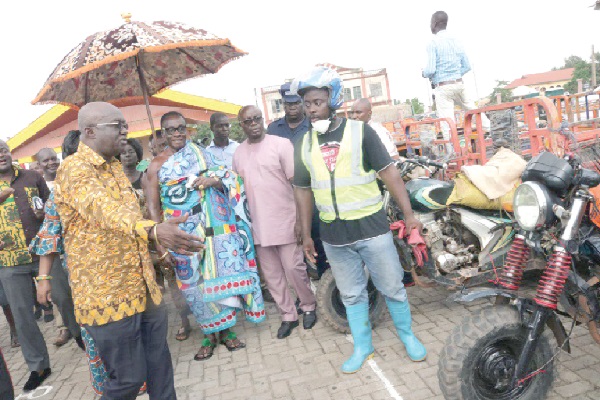
KMA moves to regulate operations of waste collection tricycles
To regulate the use of tricycles in waste collection, the Kumasi Metropolitan Assembly (KMA) has launched branded tricycles for the collection and disposal of waste in the metropolis.
The measure is also to check indiscriminate littering and dumping of solid waste by operators of waste collection tricycles, which has gained a lot of popularity in Kumasi in recent times.
In addition, the move is to ensure that tricycles used to cart solid waste are not used to transport food items.
Orange colour
The KMA has branded the solid waste tricycles in orange to help the public identify and use them accordingly.
The assembly has also issued identification numbers and tags to all the waste collection tricycles in a bid to regulate and monitor their activities, while the riders are to wear prescribed protective gear in the discharge of their duties.
Launch
Speaking at the ceremony to officially launch the branded tricycles, the Minister for Sanitation and Water Resources, Mr Joseph Kofi Adda, commended the KMA for mooting the idea and working tirelessly to ensure that the scheme was implemented.
He challenged other metropolitan, municipal and district assemblies (MMDAs) to emulate the "shining example" of the KMA.
"The KMA is the first assembly to have come up with such a laudable initiative, outdoing my directive," he said.
Mr Adda urged the public to report operators of tricycles which collected waste without the prescribed specifications to the authorities.
He welcomed plans by the KMA to launch the "Keep Kumasi cleaner and green campaign” to further improve sanitation and restore the vegetative cover of the city.
Dream come true
In his welcome address, the Metropolitan Chief Executive (MCE) for Kumasi, Mr Osei Assibey Antwi, said the branding of the tricycles was a dream come true for the Assembly.
"The tricycles littered the streets indiscriminately, carried refuse uncovered and dumped refuse at unapproved sites,” he said.
He explained that the city authorities had to find a way of streamlining the operations of the waste collection tricycles “because we realised they had become a necessary evil. We could not do without them because they filled the gap created by the inadequacies of the waste management trucks".
